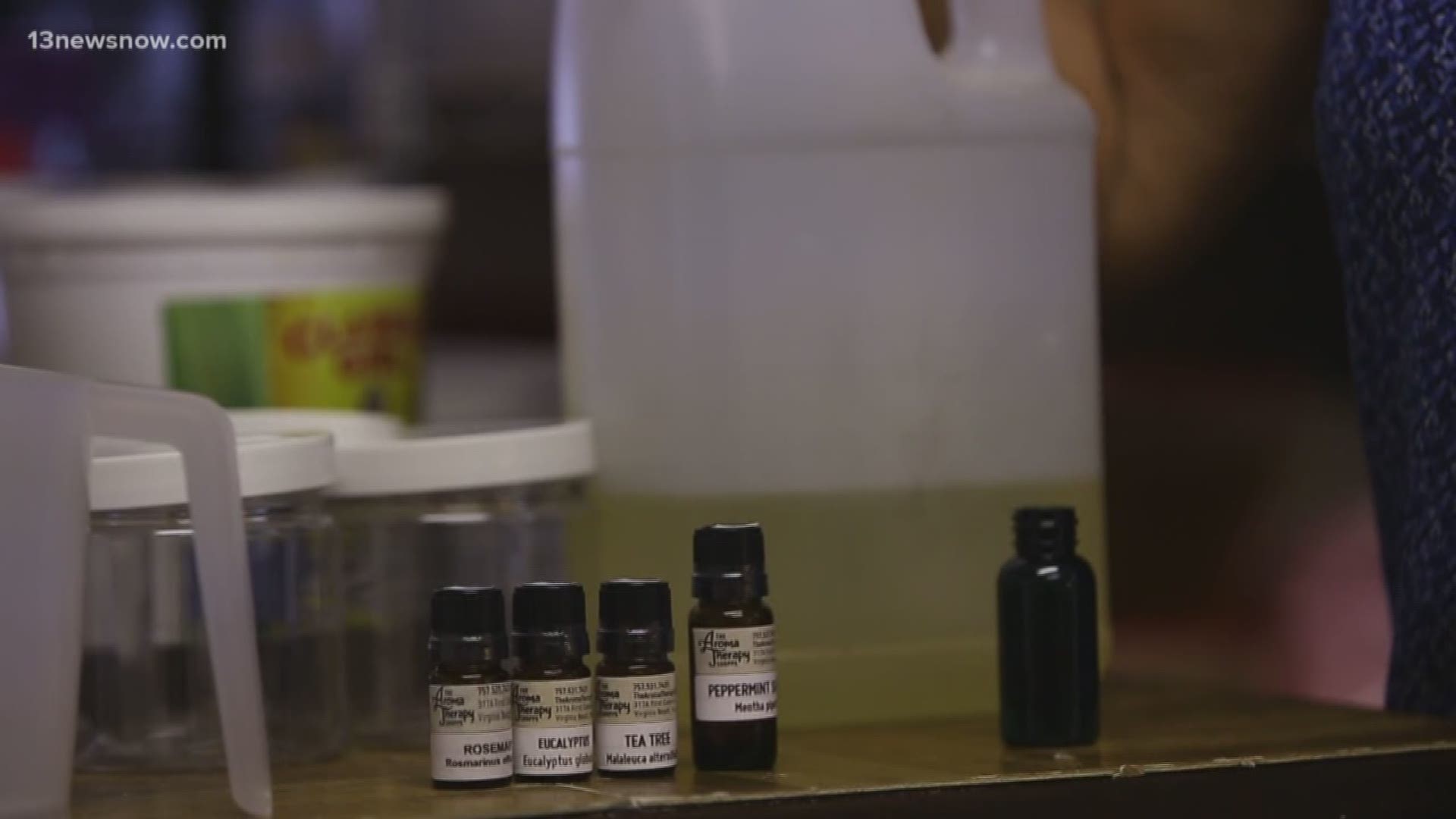VIRGINIA BEACH, Va. — Essential oils are everywhere. Online, at neighborhood grocery stores, everywhere.
Some have used them for medical reasons, but do they really work?
In a fast-paced world, people look for ways to slow down. Laura Beck is one of them, she runs Seashore Title & Settlements in Virginia Beach.
“It’s quite high pressure from the moment I step in,” said Beck.
The stress of being in charge of a title and escrow company led Beck to seek stress relief from tiny bottles of essential oils extracted from plants.
Beck has used the oils in her office and home for 10 years. She swears by the products, which she said have improved her quality of life.
“They allow me to slow down and decompress,” said Beck.
As the oils have gained popularity, Marthica McDermott, a certified aromatherapist with the National Association for Holistic Aromatherapy has warned customers to avoid getting carried away with the oils.
McDermott owns the Aromatherapy Shoppe in Virginia Beach. Her product range from lotion to soap, and they’re all made from essential oils.
While she has managed to successfully run a business filled with essential oil products, McDermott said consumer safety is her top priority.
She has urged people not to rely on the oils to treat illnesses or medical issues.
“Let’s be real, they work to their capacity. Not to the promises that are made by people that have no proof,” said McDermott. “I think some companies are recommending the use of the oils a little bit recklessly, the motivation to sometimes sell a lot. I do have an issue with that.”
Through the years, the Food and Drug Administration has cracked down on multi-level-marketing companies that have claimed the oils can cure serious diseases.
In a 2014 warning letter from the FDA to Young Living, the FDA blasted the essential oil company for its marketing techniques.
On multiple occasions, the company’s consultants made claims that the oils are capable of treating cancer, diabetes, lupus, heart disease, and more.
Joe Schwarcz, a chemist and director of the McGill Office for Science and Society has conducted extensive research on the products.
“There just is no significant scientific evidence for the benefits that are claimed on behalf of the essential oils,” said Schwarcz.
While the FDA does not regulate the products, it can prevent companies from making drug claims. When companies and their consultants claim the oils can treat medical problems, the FDA has to step in.
“If someone wants to put a few drops of lavender oil into a diffuser in their house because it makes the house smell nicer, okay. I don’t have any issue with that, but when someone suggests that you have to take some sort of oil and rub it on a forehead and it has to be in a clockwise direction so that it will align your chakras or change the frequency of your DNA, then, of course, I take issue with that,” said Schwarcz.
Mcdermott’s shelves are stocked with the products customers turn to for relaxation and relief. From rosemary to eucalyptus, tea tree, and peppermint, she has it all in her store. Even then, she said pure essential oils can be dangerous if they’re not used correctly.
“Natural doesn’t mean good,” said McDermott. “A lot of natural things are harmful. You can walk through poison ivy and not love what happens after.”
McDermott said people should never apply large amounts of pure essential oils onto their body. She recommends mixing the pure oils with a carrier oil, such as olive. If pure oils are not diluted, they can be harmful.
For example, McDermott recalled a time when one of her customers lathered a large amount of a citrus-based oil onto her body. Shortly after, the woman laid out in the sun at the beach. McDermott said the customer experienced phototoxicity, a chemically induced skin irritation, which left markings on her body.
McDermott has especially warned people against drinking essential oils, something she said is a serious danger.
By law, a certified aromatherapist cannot recommend the oral consumption of essential oils. McDermott teaches courses about aromatherapy, and safety is the most important lesson.
“I tell my students that if they’re gonna recommend to somebody to drink an essential oil, get on the move and get a lot of liability insurance because it’s not ethical for us to do it,” said McDermott.
She said the best way to use the oils is by simply breathing them in through a diffusor, candle, or directly from the bottle. Schwarcz agrees.
“There’s no real monitoring of what is in these products, which is usually not a problem when it’s just a scent. But when they’re telling them to ingest these things, you don’t even know what is really in there because the FDA doesn’t monitor that,” said Schwarcz.
Beck said she uses the oils safely. She disagrees with those who don’t believe the oils provide any benefit or relief.
“I think they need to give them a try. I’m thinking they haven’t used them or they don’t really know the different smells and what they can do for you,” said Beck.
She said if essential oils can help her wind down after a tough day in the office, then she’ll let the aromas keep lingering in the air for her to breathe in.

